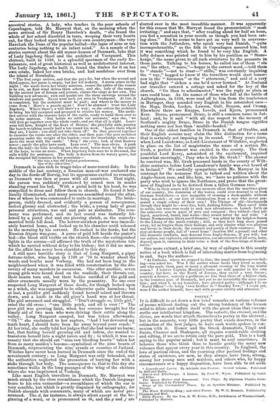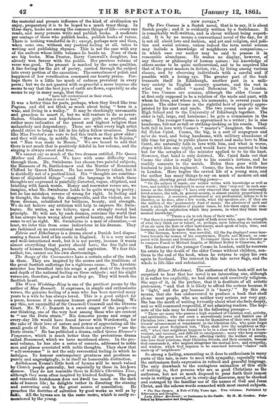POETRY. *
IT is difficult to set down a few brief remarks on various volumes of poems without finding out the strong tendency of the human mind to dilate and inflate itself with the great ideas that circum- scribe our intellectual kingdom. The iqfinite, the eternal, and the divine, are words that attach themselves to poetry in the abstract; but in the concrete, very little poetry that exists deserves, in the estimation of the best judges, to have such words spoken in con- nexion with it. Homer and the Greek dramatists, Virgil and Dante, Chaucer and Shakspere, all require considerable shaking and sifting, if we are to retain only the pure gold. This is a hard saying to the popular mind ; but it must be said sometimes. It behoves those who think thus to handle gently the many new volumes that appear every year in this country. In England, the love of poetical ideas, and the yearning after poetical feelings and states of existence, are now, as they always have been, strong, among her young men and maidens, and others who, by happy circumstances or a happy disposition, have been able to set aside
• Legends and Lyrics. By Adelaide Ann Proctor. Second volume. Published by Bell and Daldy. Edwin and Ethelburga. A Drama. By Fred W. Wyon. Published by Smith and Elder.
The Queen Mother and Rosamond. Two Plays. By Algernon Charles Swin- burne. Published by Pickering.
Songs of the Covenanters' Times. By an Ayrshire Minister. Published by Nimmo.
The Worn Wedding-Ring ; and other Poems. By W. C. Bennett. Published by Chapman and Hall. Daily Hymns. By the Yen. R. NV. Evans, B.D., Archdeacon of Westmoreland. Published by Masters. the material and prosaio influence of the kind of civilization we enjoy, preparatory it is to be hoped to a much truer thing. In these days, books are among, the common things of life—every one reads, and many persons write and publish books. A moderate per tentage of those who publish books, publish books of verses. There is nothing wonderful in it; except, perhaps now and then, when some one, without, any poetical feeling at all, takes to writing and publishing rhymes.. This is not the case with any of the authors whose little volumes lie beside us. None of them are big books. Miss Proctor, Barry Cornwall's daughter, has already won favour with the public. Her previous volume of verse was good. The present is marked by the same qualities. A fine feeling for the art of poetry, carried through the subject
into every portion of the execution. The correctness of polish and happiness of her versification command our hearty praise. Per- haps there is a little too much of sadness prevalent in every poem; but we do not quarrel with so graceful a muse because she seems to say that the best joys of earth are flown, especially as she seems to say in many songs, that they
have left contentment in their stead, And that is next to best."
It was a better time for poets, perhaps, when they lived like true
, and did not think so much about being " born in a wale, and living in a walley." It may be shockingly unromantic and graceless to assert it, but we will venture to do so never- theless. Gladness and hopefulness are quite as poetical, and rather more indicative of the purest and highest religion than melancholy and despondency. These are what every high artist should strive to bring to life in his fallen fellow creatures. Souls Jae Miss Proctor's are sure to feel this truth as they grow older ; and they will sing, in middle life, "Man was made to Rejoice," not " Man was made to Mourn." We are bound to add that there is not much that is positively doleful in her volume, and the singing is always sweet and true.
We cannot say so much of the two dramas entitled, The Queen Mother and _Rosamond. We have with some difficulty read through them. Mr. Swinburne has chosen two painful subjects, the Massacre of St. Bartholomew and the Murder of Rosamond Clifford by Queen Eleanor. He has some literary talent, but it is decidedly not of a poetical kind. His " thoughts are combina- tions of disjointed things "—and the language in which these thoughts are expressed is painfully distorted, vague, elliptical, and bristling with harsh words. Honey and rosewater verses are, we
imagine,• what Mr. Swinburne holds to be quite wrong . te wren.' in poetry ; but he has mistaken reverse of wrong for right. In feeling and in thought, the daring, the disagreeable, and the violent, are in these dramas, substituted for boldness, beauty, and strength. We do not believe any criticism will help to improve Mr. Swin- burne. He writes, as we believe, upon a strongly rooted bad rinciple. lie will not, by such dramas, convince the world that it has always been wrong about poetical beauty, and that he has come to set as right. Mr. Swinburne is a man of education,—at least, we infer this from some indications in his dramas. They are fashioned on no conventional model.
Edwin and _Ethelburga is a drama about a Danish lord dispos- sessing a Saxon lord of his castle in England. It is a very moral and well-intentioned work, but it is not poetry, because it wants almost everything that poetry should have, the fine light and beauty of human thought, passion, and aspiration. We fear this author, too, cannot see his own shortcomings. The Songs of the Covenanters have a certain echo of the truth in them. They are inspired by the scenes and the traditions of the great Scottish sufferings for a righteous cause. The Ayrshire minister has breathed into his songs a good deal of the warmth and depth of the national feeling on these subjects ; and his slight verses are, therefore, good as far as they go. They will touch the Scottish heart.
The Worn Wedding-Bing is one of the prettiest poems by the author of May Bennett. It expresses, in simple and enthusiastic verses, the genuine feeling of a man who has been married many years to a wife he has always loved. This is a good subject for a poem, because it is common human ground for feeling. We my this, not unmindful of Sir Cresswell Cresswell and the Divorce Court. Mr. W. C. Bennett is a sweet singer of the people—to our thinking, one of the very best among those who are content to " use the Dorio strain." His domestic poems and songs of every-day life would have found favour with Wordsworth, for the sake of their love of nature and power of appreciating all the small goods of life. But Mr. Bennett does not always " use the Doric strain." He has published a drama, called Queen Eleanor's Vengeance, which is much better than the pretentious drama Galled Rosamond, which we have mentioned above. In the pre- sent volume, he has also a series of sonnets, addressed to noble men and places associated with noble thoughts. They show that " self-reverence " is not the only reverential feeling in which he indulges. To honour contemporary greatness and goodness so purely and ungrudgingly, is in itself an honourable distinction.
Archdeacon Evans's little book of hymns will be much valued by Church people generally, but especially by those in his town diocese. They do not resemble those in Keble's Chris' Liam Year, although they seem often inspired by kindred feelings. The good and venerable Archdeacon does not dwell too much on the dark side of human life; he delights rather in directing the sinning and sorrowing soul to the great source of consolation. He preaches the doctrine of salvation by good works as well as by foaitli. All the hymns are in the same metre, which is easily re- membered by the young.



























 Previous page
Previous page